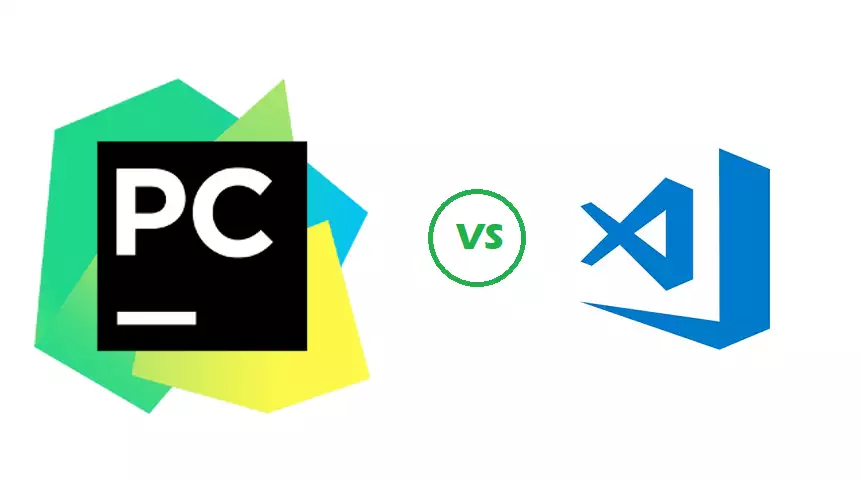PyCharm or Visual Studio Code – Choosing the right integrated development environment (IDE) for your programming needs is crucial. For Python development, two popular choices are PyCharm and Visual Studio Code. Both offer unique features and advantages that cater to different preferences and requirements. In this article, we’ll compare PyCharm and Visual Studio Code to help you make an informed decision on which one suits you best.
Overview of PyCharm
PyCharm is a powerful and feature-rich IDE developed by JetBrains specifically for Python development. It provides a comprehensive set of tools and features to enhance productivity and streamline the development process. With its intelligent code editor and extensive libraries, PyCharm is a top choice for many Python developers.
Features of PyCharm
Intelligent Code Editor
PyCharm’s code editor offers smart code completion, code navigation, and code analysis. It provides suggestions and auto-completion based on the context, saving developers valuable time. The editor also supports refactoring, allowing for efficient code restructuring.
Debugging and Testing Tools
PyCharm includes robust debugging and testing capabilities. It enables developers to set breakpoints, step through code, and inspect variables during runtime. The integrated test runner makes it easy to write and run unit tests for your Python projects.
Version Control Integration
PyCharm seamlessly integrates with version control systems like Git, allowing developers to manage their code repositories directly within the IDE. It provides features such as diff viewers, committed tools, and branch management.
Web Development Support
In addition to Python, PyCharm offers excellent support for web development. It includes features like HTML, CSS, and JavaScript editors, as well as support for popular web frameworks such as Django and Flask.
Database Tools
PyCharm provides built-in database tools that allow developers to interact with databases directly from the IDE. It supports various database systems, including MySQL, PostgreSQL, and SQLite, offering features like schema visualization, query execution, and data management.
Pros of PyCharm
PyCharm comes with several advantages that make it a popular choice among Python developers:
- Rich set of features: PyCharm offers a comprehensive range of features that cater specifically to Python development needs. From code analysis to version control integration, it provides a robust toolkit for efficient coding.
- Excellent support for Python development: Being designed explicitly for Python, PyCharm provides extensive support for the language. It offers intelligent code completion, refactoring capabilities, and a powerful debugger tailored for Python code.
- Seamless integration with popular frameworks: PyCharm seamlessly integrates with popular Python frameworks like Django, Flask, and Pyramid. It provides project templates, automatic imports, and context-aware suggestions to streamline development with these frameworks.
- Robust debugging capabilities: PyCharm’s debugger allows developers to step through their code, set breakpoints, and inspect variables during runtime. This makes it easier to identify and fix bugs, leading to more reliable and efficient code.
Cons of PyCharm
While PyCharm offers numerous advantages, it also has some limitations to consider:
- Resource-intensive: PyCharm is a feature-rich IDE that requires significant system resources to run smoothly. It can be resource-intensive, particularly on older or less powerful machines, which may affect performance.
- Steeper learning curve: Due to its extensive feature set, PyCharm has a steeper learning curve compared to simpler text editors or lightweight IDEs. Beginners might need some time to familiarize themselves with all the available features and maximize their productivity.
- Paid license for advanced features: While PyCharm has a free Community Edition, some advanced features and integrations require a paid license, which may not be ideal for developers on a tight budget.
Overview of Visual Studio Code
Visual Studio Code (VS Code) is a lightweight and versatile code editor developed by Microsoft. It has gained popularity among developers across different programming languages, including Python. With its simplicity, customizability, and extensive extension ecosystem, Visual Studio Code has become a preferred choice for many developers.
Features of Visual Studio Code
Lightweight and Versatile
Visual Studio Code is known for its lightweight nature, making it fast and responsive even on lower-end machines. It consumes fewer resources compared to full-fledged IDEs, while still providing a powerful coding experience.
Customizable and Extensible
One of the major strengths of Visual Studio Code is its extensive customization options. Developers can personalize the editor’s appearance, keybindings, and extensions according to their preferences. The extension marketplace offers a vast collection of plugins to enhance functionality for various programming languages.
Integrated Git Support
Visual Studio Code has built-in Git support, making it convenient for version control tasks. It provides features like source control integration, visual diff tools, and seamless collaboration with Git repositories.
Language Support and Extensions
While Visual Studio Code supports a wide range of programming languages, it also provides language-specific extensions to enhance development experiences. These extensions offer features like linting, code formatting, and IntelliSense for specific languages, including Python.
Integrated Terminal
Visual Studio Code includes an integrated terminal, allowing developers to execute commands and run scripts without leaving the editor. This eliminates the need to switch between the editor and external terminals, enhancing workflow efficiency.
Pros of Visual Studio Code
Visual Studio Code offers several advantages that make it a popular choice among developers:
- Wide range of programming language support: Visual Studio Code supports multiple programming languages, making it suitable for developers working with different technologies.
- Fast and lightweight: Visual Studio Code is known for its speed and efficiency. It is designed to be a lightweight code editor that performs well even on less powerful machines, ensuring a smooth coding experience.
- Vast collection of extensions: Visual Studio Code has a rich extension marketplace that provides a wide variety of plugins and extensions. This allows developers to customize their editor and add functionality specific to their needs.
- Strong community and active development: Visual Studio Code has a thriving community of developers and a dedicated team behind its development. This ensures regular updates, bug fixes, and new features based on user feedback and evolving needs.
Cons of Visual Studio Code
While Visual Studio Code has numerous benefits, it also has a few limitations to consider:
- Fewer specialized Python features: While Visual Studio Code supports Python development, it may not have the same level of specialized features as PyCharm. PyCharm offers dedicated tools and integrations for Python-specific development tasks, which may be important for certain projects.
- May require additional extensions for specific use cases: Although Visual Studio Code has a wide range of extensions, some specific use cases may require additional plugins or customization to match the capabilities of PyCharm.
- Less robust debugging compared to PyCharm: While Visual Studio Code provides debugging functionality, PyCharm’s debugger is known for its advanced capabilities and seamless integration with Python projects.
Comparison between PyCharm and Visual Studio Code
When deciding between PyCharm and Visual Studio Code for Python development, several factors come into play. Here’s a comparison to help you evaluate which one suits your needs:
- Python-specific development: If your primary focus is Python development and you require a comprehensive set of Python-specific features, PyCharm might be the better choice. It offers a wide range of specialized tools and integrations tailored specifically for Python.
- Overall feature set: PyCharm is a full-fledged IDE with an extensive feature set, including advanced debugging, database tools, and web development support. Visual Studio Code, on the other hand, offers a more lightweight and customizable experience, catering to a broader range of programming languages.
- Performance and resource usage: Visual Studio Code is known for its lightweight nature and efficient resource usage, making it suitable for low-spec machines or projects where performance is a concern. PyCharm, being a feature-rich IDE, may require more system resources.
- Learning curve and ease of use: PyCharm’s extensive feature set and specialized tools may result in a steeper learning curve, particularly for beginners. Visual Studio Code, with its simplicity and intuitive interface, offers a more accessible entry point for developers of all levels.
- Cost and licensing: PyCharm has both free and paid versions, with the paid version providing additional features. Visual Studio Code, on the other hand, is completely free and open-source.
Conclusion
In conclusion, both PyCharm and Visual Studio Code are powerful tools for Python development, each with its own strengths and advantages. PyCharm offers a comprehensive set of Python-specific features, robust debugging capabilities, and seamless integration with popular frameworks. Visual Studio Code, on the other hand, provides a lightweight and customizable coding experience, supporting a wide range of programming languages with a vast extension ecosystem.
The choice between PyCharm and Visual Studio Code ultimately depends on your specific needs and preferences. Consider factors such as the nature of your project, desired features, performance requirements, learning curve, and budget. It may also be beneficial to try out both IDEs and see which one aligns better with your workflow and coding style.
FAQs
FAQ 1: Can I use PyCharm for languages other than Python?
Yes, while PyCharm is primarily designed for Python development, it also supports other programming languages such as JavaScript, HTML, CSS, and more. It offers language-specific features and integrations to enhance the development experience for these languages as well.
FAQ 2: Is Visual Studio Code only suitable for web development?
No, Visual Studio Code is a versatile code editor that supports a wide range of programming languages, including but not limited to web development languages. It can be used for various purposes, including backend development, frontend development, data analysis, and more.
FAQ 3: Does Visual Studio Code have an integrated terminal?
Yes, Visual Studio Code includes an integrated terminal that allows you to run commands and execute scripts directly within the editor. The terminal can be accessed with a simple keyboard shortcut, making it convenient to perform various tasks without switching to external terminals.
FAQ 4: Can I use both PyCharm and Visual Studio Code together?
Absolutely! Many developers use multiple IDEs or code editors for different projects or tasks. You can use PyCharm for Python-specific development and Visual Studio Code for other programming languages or as a lightweight alternative when performance or customization is a priority.
FAQ 5: Can I customize the appearance of PyCharm and Visual Studio Code?
Yes, both PyCharm and Visual Studio Code allow customization of their appearance. You can choose different themes, modify the font size and style, and customize various aspects of the user interface to create a personalized coding environment that suits your preferences.
com Domain Registration | Buy a .com Domain Name Today
Search The Domain Name You Want com Domain Registration – The internet has become an
Best Ransomware Detection Techniques
22 May 2023What is Drupal used for?
22 May 2023Is PrestaShop a CMS or Framework?
22 May 2023







